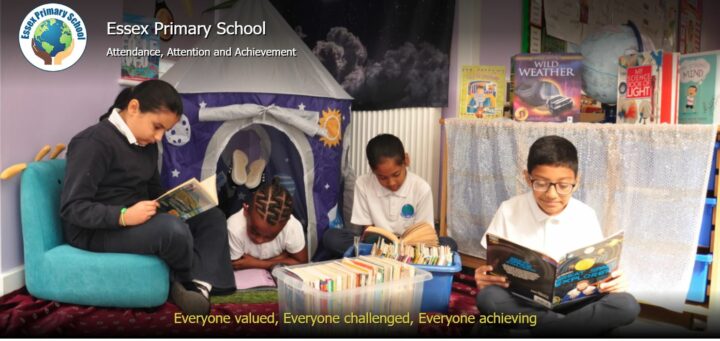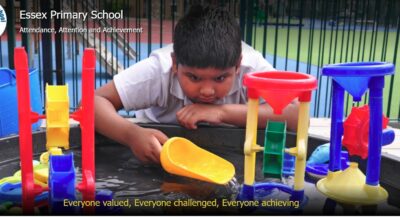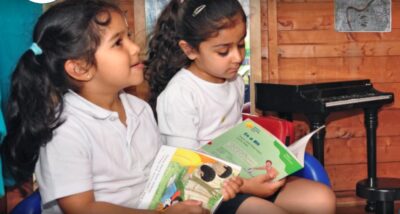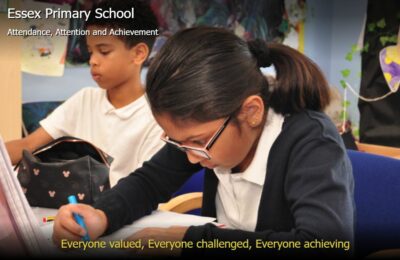Who is IQM?
IQM is the only national inclusion award in the UK. For over 20 years and in over 20 countries, schools, MATs and Local Authorities use the Inclusion Quality Mark to recognise exemplary inclusive practice.
Get in touch for your FREE school information pack today.
Essex Primary Achieves Flagship Status
April 17, 2023
Essex Primary School has achieved the Inclusive School Award with Flagship Status.

‘Inclusion Journey Never Ends’
The ‘driver’ for the Executive Headteacher at Essex Primary School is the awareness that the “inclusion journey never ends. There’s always something new that we can offer our Special Educational Needs and Disability SEND and High Needs pupils and IQM and other external validations (achieved) are incentive for us to continue to learn more.”
Being in their ninth year of an IQM Flagship Status School, some staff have articulated that they are only, “doing their job and it’s been recognised!”. The many IQM plaques prominently displayed in the school foyer are there for celebratory purpose but also as a gentle reminder to staff, “to stay focused, not to slip up” on pupils’ learning.
Post Covid-19 pandemic, the “excellent support” provided and recognised for pupils with complex needs in the 2019 Ofsted report was apparent during the day of the review. Indeed, the automatic and high degree of inclusion is pervasive; warm and welcoming staff, vibrant displays, purposeful resources, specialist training for all stakeholders, regular involvement of external experts, positive relationships, engaged learning, access to innovative learning. It is clear that pupils are at the heart of everything that the school provides.
‘Get Set for Learning’
To ‘Get Set for Learning’ each morning, this group of pupils, after having registered in their mainstream classes, experience Sensory Circuit where a wide variety of motivational physical activities take place with Pharrell Williams’ ‘Happy’ playing in the background. Eight pupils with complex needs joined the smiling and encouraging adults who modelled and participated alongside. This 20-minute session encompasses the school vision where each pupil is seen to be ‘valued, challenged and achieving’.
The aims ‘of high expectations, stimulating learning in a calm and safe environment’ were evident during the learning walk as well as in all other practices observed, such as Sensory Story, Attention Autism, Upper KS2 story/drama based activity using the ‘Enormous Turnip’. Although highly structured, every session was packed with exciting materials, rich with language and instructions, “bucket, shooting caterpillars, ready steady, splat, my turn, your turn, who’s next, pull, snowstorm, splash”. The fact that every pupil in each of the sessions responded immediately to “freeze!” and “we are finished” showed a high level of co-operation and respect to the adults and to the embedded behavioural expectations of the school.

The IQM intent for the year has been to develop an informal and semi-formal curriculum that fosters the highest level of independence for pupils with highest needs. The progression of skills, knowledge and attitudes to learning, have been carefully mapped in the KS1 curriculum. Skills such as developing, sustaining and re-engaging attention, maintaining self -regulation, turn taking and sharing, dressing and undressing, repetitive communication together with the knowledge of weather, gardening and food, are all planned so that they are prepared, as much as possible, for the next phase of their learning, their lives and eventually, for adulthood.
Emphasis placed on regular evaluation and reflection on planning and delivery resulted in, for example, using the key story for 6 weeks (previously fortnightly). A turning point for staff understanding the significance of repetition over a longer timescale has led to learning at greater depth. One pupil was quoted as saying, “more again. I want to do this again” which was a mammoth shift from little or no communication before.
Empathy and Kindness
“Everyone is included in everything, even if you have a disability”, shared 1 passionate pupil, echoing the first aim whereby the delivery of positive caring and clearly focused leadership is provided by the Senior Leadership Team (SLT). Meeting with 4 enthusiastic pupils, not part of the complex needs’ group, 1 explains that a boy in her class is “always alone”. Remembering a discussion in class on this aspect of inclusion, she offered to play with him which made her feel “happy” inside because he was happy that he had someone to play with.
As the adults in class constantly remind pupils of the importance of helping each other, a pupil shared her experience of a time when she was “struggling” with a piece of written work. A peer noticed her expression and asked if she “needed help”. Taking up this offer, she proceeded to get her work done, feeling “happy and relieved”. She shared that the teacher also was happy because everyone in the class had completed their task and “felt included”. The school’s policy of, “changing seating partners” in every lesson has meant all the children “know” everyone well and relate with empathy and kindness.

Instilling ambition in pupils and aiming high is yet another hallmark of Essex Primary School. Pupils in Year 6, excelling in their most recent assessment, were chosen to be part of the Brilliant Club. After walking around the grounds and colleges at Oxford University and taking part in a Question and Answer session with the university students, Essex pupils were excited and animated about the prospect of going on to further education. One pupil expressed her dream of studying Biology at Oxford.
Through an exciting curriculum as well as the provision of extra-curricular activities (day trips, visits, clubs, trips abroad through Erasmus project), the pupils gleefully take the opportunities to learn new skills and knowledge to improve their chances to engage with the wider world.
Teaching staff, at the end of the school day, offer opportunity to parents to share issues with each other. Trusting relationships built as a result of the school’s pro-active approach has led to a reduction in parents’ anxiety of leaving their child with the teachers. On seeing the positive impact the school is making on their child’s lives, many parents have asked the school to provide them with resources such as the core boards which aids communication at home and, in turn, creating consistency in practice and expectations.
‘Putting the Children First’
Consistency through “teamwork and all being on the same page”, as confirmed by one TA, has meant that this group of pupils feel secure about attending their school. Autism Acceptance assembly (part of the National Autism Week), to which the school invites the siblings of autistic pupils into the school to answer questions such as, “why do they sit silently?” or “why are they not talking/making sounds?” The outcome of this is displayed in greater kindness, a greater show of understanding and patience, typified by the pupils asking to lay the cutlery out in the dining hall, offering to pour water for the children, “looking after them” at play and lunchtimes and zipping their coats at home time.
“Putting the children first” is central to what Essex Primary is about, explained a parent Governor. Noticing the need to tackle obesity, particularly after the Covid-19 pandemic, the school has increased opportunities for physical education activities for all pupils. The Pupil Premium (PP) information details the priority placed on “wellbeing” by bringing in further resources, such as counselling and professional musicians. This enables learners more opportunity to perform musical skills and therefore tackles low self-esteem and lack of confidence which is often evident in pupils from disadvantaged backgrounds.

Year 4 and Year 5 are offered swimming lessons over and above most schools where daily sessions have shown to have greater impact. Due to the school being For Further Education (4FE), the school planned for one 8am swimming session followed by a group at 9am. Breakfast club is offered to the siblings of children attending the earlier session which is another example of the school’s truly inclusive practice and outlook. Parents feel reassured and children feel safe in learning a new life skill, knowing that the accompanying school staff, along with pool instructors are in the pool.
The review day succeeded in capturing the essence of the inclusion project of semi-formal and informal curriculum. Several in-depth discussions with the Inclusion Lead also helped in understanding the significance of this work in the school context. Certainly, close ties with the Local Authority specialist personnel such as the Speech and Language Therapist (SALT), the Occupational Therapist (OT) and the School Improvement Partner (SIP) have resulted in the school being frequently visited by staff and senior leaders from other schools, both within and outside the borough as well as international visitors looking at and learning from innovative practices in inclusion.
Recording the specifics of the innovative (informal/semi-formal) curriculum planning and provision for pupils with complex needs in a mainstream school setting and its successes, is an area the SLT are reflecting on to be an explicit part of the School Development Plan (SDP) and the School Evaluation Form (SEF).
Small but Significant Progress
The Inclusion Lead agrees that this curriculum “matches the school aims as it is part of the main curriculum, but delivered at a different level”. The fact that it has “taken a long time to get to this point of formulating the informal curriculum”, reinforces the need to recognise the achievement in the strategic documents. The Inclusion Team have made plans to replicate the KS1 informal curriculum for KS2 pupils with complex needs.
The Inclusion Team carefully records the pupils’ progress through assessment tools such as Tapestry, Individual Education Plans (IEPs) and annual reviews. The small but significant learning progress made such as pupils beginning to make eye contact, expressing preferences, exercising self-regulating emotions and behaviour, responding to and participating in learning activities, amongst other achievements, are qualitatively recorded.

Discussions with the Inclusion Lead have heightened the understanding of the need to ‘quantify’ pupil progress. ‘P’ scales are only appropriate for some pupils with complex needs but a system to record pre ‘P’ levels achievement is being considered.
In concluding the review at Essex Primary School, our Assessor said they were particularly struck by the honesty, integrity and humility of all the adults and pupils met on the day.
They added, “The school is an oasis of calmness with a sense of purpose where nothing is left to chance where it involves pupils learning at all levels. Based on everything that I have observed on my visit and insights gained from many deep and enthralling discussions, I have every confidence in the school’s commitment and capacity to continue to successfully deliver all its stated Flagship targets.”
Find out more about the IQM Inclusive School Award
If your school is interested in obtaining the IQM Inclusive School Award or you wish to talk to a member of the IQM team please telephone:
028 7127 7857 (9.00 am to 5.00 pm)
or email: info@iqmaward.com for further details.
Want more information on the IQM Award? Click here to request your free IQM information pack.
Other Posts

About IQM
The only national award for inclusion in the UK, IQM has been committed to recognising exemplary inclusive schools for over 20 years and in over 20 countries around the world. The three awards allow schools and organisations to celebrate their inclusive practice against nationally recognised framework.
Site Links
© 2026 Inclusion Quality Mark | website developed & cared for by digidoda


